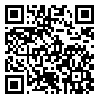دوره 22، شماره 1 - ( 12-1403 )
جلد 22 شماره 1 صفحات 18-13 |
برگشت به فهرست نسخه ها
Download citation:
BibTeX | RIS | EndNote | Medlars | ProCite | Reference Manager | RefWorks
Send citation to:



BibTeX | RIS | EndNote | Medlars | ProCite | Reference Manager | RefWorks
Send citation to:
Mirhosseini S, Abbasi A, Divani A, Askarinezhad F, Hasanpournamaghi S, Grimwood S, et al . The Persian version of caregiver self-efficacy scale (CSES): A psychometric evaluation among family caregivers of patients with cancer. J Res Dev Nurs Midw 2025; 22 (1) :13-18
URL: http://nmj.goums.ac.ir/article-1-1899-fa.html
URL: http://nmj.goums.ac.ir/article-1-1899-fa.html
The Persian version of caregiver self-efficacy scale (CSES): A psychometric evaluation among family caregivers of patients with cancer. Journal of Research Development in Nursing and Midwifery. 1403; 22 (1) :13-18
چکیده: (3288 مشاهده)
Background: Family caregivers of cancer patients encounter numerous challenges while providing care, and self-efficacy is a key factor in alleviating these negative effects. This study aimed to investigate the psychometric properties of the Persian version of the Caregiver Self-Efficacy Scale (CSES) among caregivers of cancer patients.
Methods: This methodological study employed a cross-sectional design involving 382 family caregivers of cancer patients in a teaching hospital in Iran, in 2024. The CSES was translated into Persian using the forward-backward procedure. The initial translation was assessed for face and content validity through both quantitative and qualitative methods. Construct validity was evaluated using exploratory and confirmatory factor analysis. Discriminant validity was examined using the Heterotrait–Monotrait (HTMT) ratio. Reliability was assessed by evaluating internal consistency using Cronbach's alpha and Mcdonald's omega, and stability was measured using intraclass correlation coefficients (ICCs).
Results: In this study, 53.7% of the participants were male, and the caregivers' mean age was 42.52 ± 11.83 years. Scale-level content validity index was reported 0.97 by expert panel during content validity stage. During the exploratory factor analysis, one item was excluded, leaving seven items were categorized into two factors: caregiver self-management and patient challenges. These factors collectively accounted for 43.9% of the variance in self-efficacy. Confirmatory factor analysis confirmed the adequacy of the model derived from the exploratory factor analysis (RMSEA = 0.05, GFI = 0.947, and CFI = 0.906). The factors demonstrated discriminant validity. Cronbach's alpha values for the patient challenges and caregiver self-management factors were 0.802 and 0.798, respectively. In addition, the ICC for these two factors was reported to be 0.830 and 0.802, respectively.
Conclusion: The Persian adaptation of the CSES demonstrates satisfactory validity and reliability for assessing the self-efficacy of family caregivers of cancer patients in Iran.
Methods: This methodological study employed a cross-sectional design involving 382 family caregivers of cancer patients in a teaching hospital in Iran, in 2024. The CSES was translated into Persian using the forward-backward procedure. The initial translation was assessed for face and content validity through both quantitative and qualitative methods. Construct validity was evaluated using exploratory and confirmatory factor analysis. Discriminant validity was examined using the Heterotrait–Monotrait (HTMT) ratio. Reliability was assessed by evaluating internal consistency using Cronbach's alpha and Mcdonald's omega, and stability was measured using intraclass correlation coefficients (ICCs).
Results: In this study, 53.7% of the participants were male, and the caregivers' mean age was 42.52 ± 11.83 years. Scale-level content validity index was reported 0.97 by expert panel during content validity stage. During the exploratory factor analysis, one item was excluded, leaving seven items were categorized into two factors: caregiver self-management and patient challenges. These factors collectively accounted for 43.9% of the variance in self-efficacy. Confirmatory factor analysis confirmed the adequacy of the model derived from the exploratory factor analysis (RMSEA = 0.05, GFI = 0.947, and CFI = 0.906). The factors demonstrated discriminant validity. Cronbach's alpha values for the patient challenges and caregiver self-management factors were 0.802 and 0.798, respectively. In addition, the ICC for these two factors was reported to be 0.830 and 0.802, respectively.
Conclusion: The Persian adaptation of the CSES demonstrates satisfactory validity and reliability for assessing the self-efficacy of family caregivers of cancer patients in Iran.
| بازنشر اطلاعات | |
 |
این مقاله تحت شرایط Creative Commons Attribution-NonCommercial 4.0 International License قابل بازنشر است. |




